ISY10212 Essay: ICT's Impact on Business, Society, and Culture
VerifiedAdded on 2022/10/10
|9
|1865
|12
Essay
AI Summary
This essay delves into the multifaceted impacts of Information and Communication Technologies (ICTs) on business, society, and culture, examining both the positive and negative consequences since the advent of the Internet. It explores how ICTs have revolutionized communication with customers, enhanced operational efficiency, reshaped business cultures, and improved security. Simultaneously, it addresses the challenges, such as high implementation costs, increased security threats, distractions, and heightened competition. The essay further discusses the crucial responsibilities of computer professionals in ensuring the ethical utilization of emerging ICT applications, emphasizing the need for good governance and ethical considerations in the development and deployment of new technologies. The analysis is supported by relevant references, providing a comprehensive understanding of ICT's role in shaping the modern world.
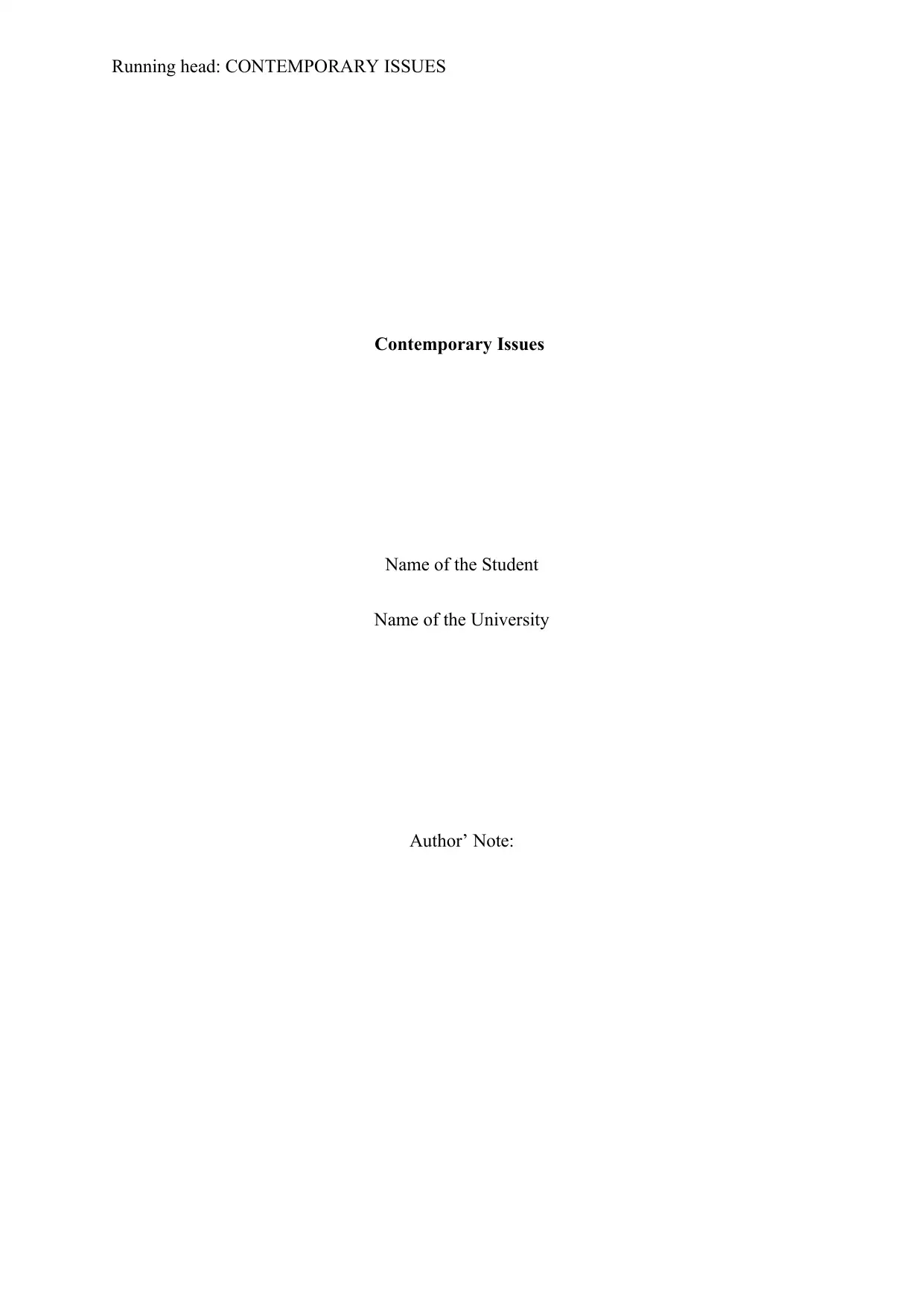
Running head: CONTEMPORARY ISSUES
Contemporary Issues
Name of the Student
Name of the University
Author’ Note:
Contemporary Issues
Name of the Student
Name of the University
Author’ Note:
Paraphrase This Document
Need a fresh take? Get an instant paraphrase of this document with our AI Paraphraser
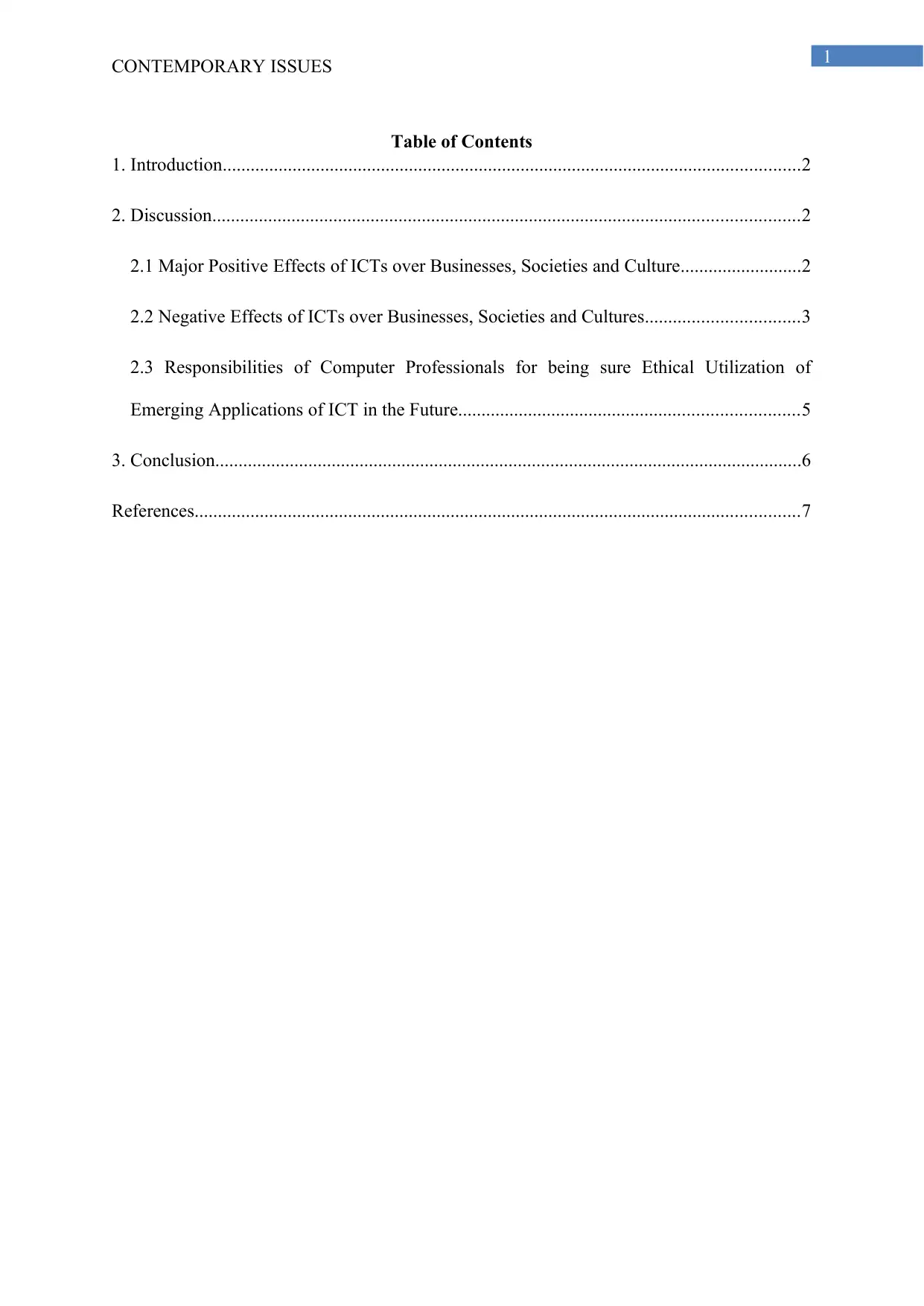
1
CONTEMPORARY ISSUES
Table of Contents
1. Introduction............................................................................................................................2
2. Discussion..............................................................................................................................2
2.1 Major Positive Effects of ICTs over Businesses, Societies and Culture..........................2
2.2 Negative Effects of ICTs over Businesses, Societies and Cultures.................................3
2.3 Responsibilities of Computer Professionals for being sure Ethical Utilization of
Emerging Applications of ICT in the Future.........................................................................5
3. Conclusion..............................................................................................................................6
References..................................................................................................................................7
CONTEMPORARY ISSUES
Table of Contents
1. Introduction............................................................................................................................2
2. Discussion..............................................................................................................................2
2.1 Major Positive Effects of ICTs over Businesses, Societies and Culture..........................2
2.2 Negative Effects of ICTs over Businesses, Societies and Cultures.................................3
2.3 Responsibilities of Computer Professionals for being sure Ethical Utilization of
Emerging Applications of ICT in the Future.........................................................................5
3. Conclusion..............................................................................................................................6
References..................................................................................................................................7
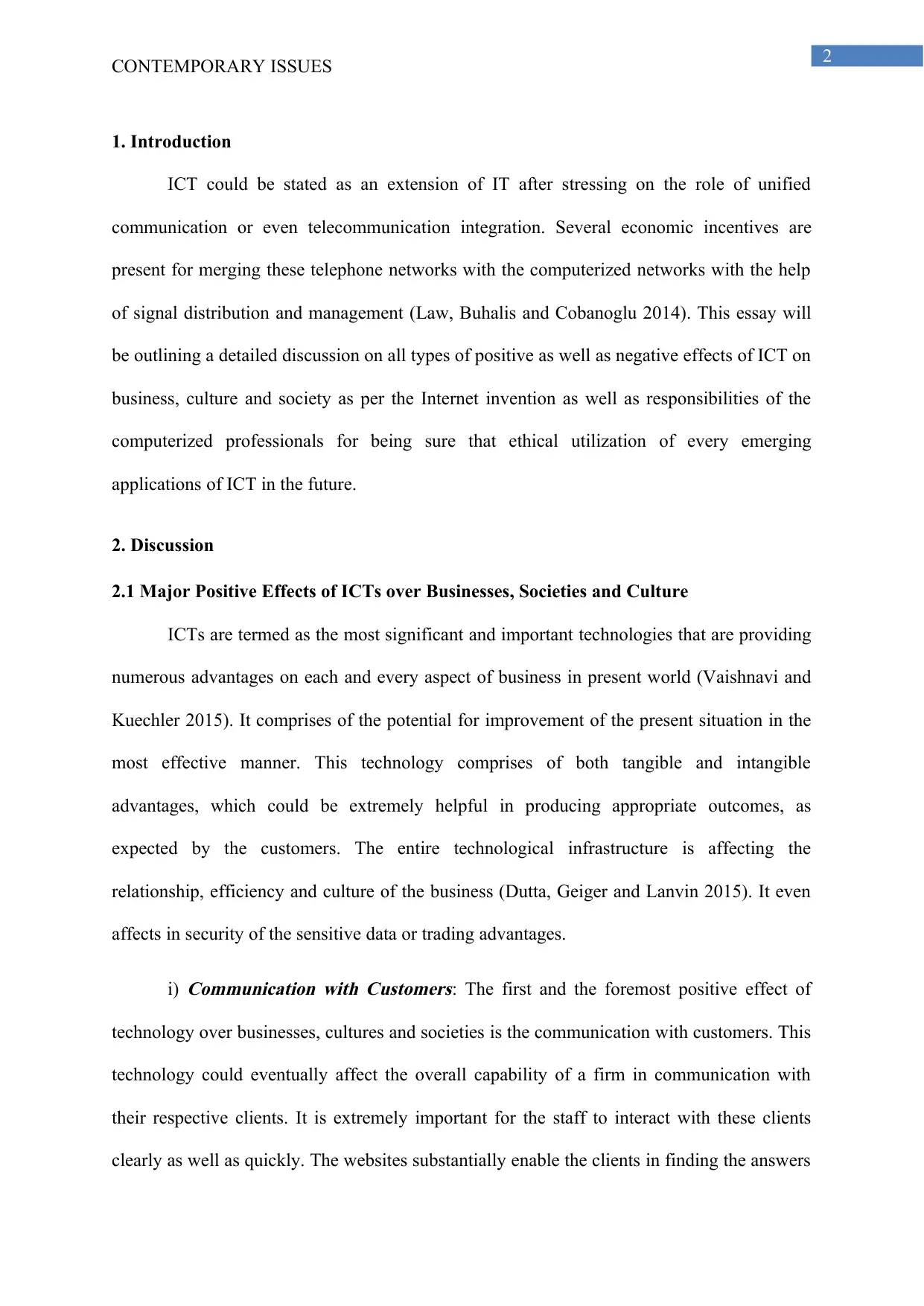
2
CONTEMPORARY ISSUES
1. Introduction
ICT could be stated as an extension of IT after stressing on the role of unified
communication or even telecommunication integration. Several economic incentives are
present for merging these telephone networks with the computerized networks with the help
of signal distribution and management (Law, Buhalis and Cobanoglu 2014). This essay will
be outlining a detailed discussion on all types of positive as well as negative effects of ICT on
business, culture and society as per the Internet invention as well as responsibilities of the
computerized professionals for being sure that ethical utilization of every emerging
applications of ICT in the future.
2. Discussion
2.1 Major Positive Effects of ICTs over Businesses, Societies and Culture
ICTs are termed as the most significant and important technologies that are providing
numerous advantages on each and every aspect of business in present world (Vaishnavi and
Kuechler 2015). It comprises of the potential for improvement of the present situation in the
most effective manner. This technology comprises of both tangible and intangible
advantages, which could be extremely helpful in producing appropriate outcomes, as
expected by the customers. The entire technological infrastructure is affecting the
relationship, efficiency and culture of the business (Dutta, Geiger and Lanvin 2015). It even
affects in security of the sensitive data or trading advantages.
i)
Communication with Customers: The first and the foremost positive effect of
technology over businesses, cultures and societies is the communication with customers. This
technology could eventually affect the overall capability of a firm in communication with
their respective clients. It is extremely important for the staff to interact with these clients
clearly as well as quickly. The websites substantially enable the clients in finding the answers
CONTEMPORARY ISSUES
1. Introduction
ICT could be stated as an extension of IT after stressing on the role of unified
communication or even telecommunication integration. Several economic incentives are
present for merging these telephone networks with the computerized networks with the help
of signal distribution and management (Law, Buhalis and Cobanoglu 2014). This essay will
be outlining a detailed discussion on all types of positive as well as negative effects of ICT on
business, culture and society as per the Internet invention as well as responsibilities of the
computerized professionals for being sure that ethical utilization of every emerging
applications of ICT in the future.
2. Discussion
2.1 Major Positive Effects of ICTs over Businesses, Societies and Culture
ICTs are termed as the most significant and important technologies that are providing
numerous advantages on each and every aspect of business in present world (Vaishnavi and
Kuechler 2015). It comprises of the potential for improvement of the present situation in the
most effective manner. This technology comprises of both tangible and intangible
advantages, which could be extremely helpful in producing appropriate outcomes, as
expected by the customers. The entire technological infrastructure is affecting the
relationship, efficiency and culture of the business (Dutta, Geiger and Lanvin 2015). It even
affects in security of the sensitive data or trading advantages.
i)
Communication with Customers: The first and the foremost positive effect of
technology over businesses, cultures and societies is the communication with customers. This
technology could eventually affect the overall capability of a firm in communication with
their respective clients. It is extremely important for the staff to interact with these clients
clearly as well as quickly. The websites substantially enable the clients in finding the answers
⊘ This is a preview!⊘
Do you want full access?
Subscribe today to unlock all pages.

Trusted by 1+ million students worldwide
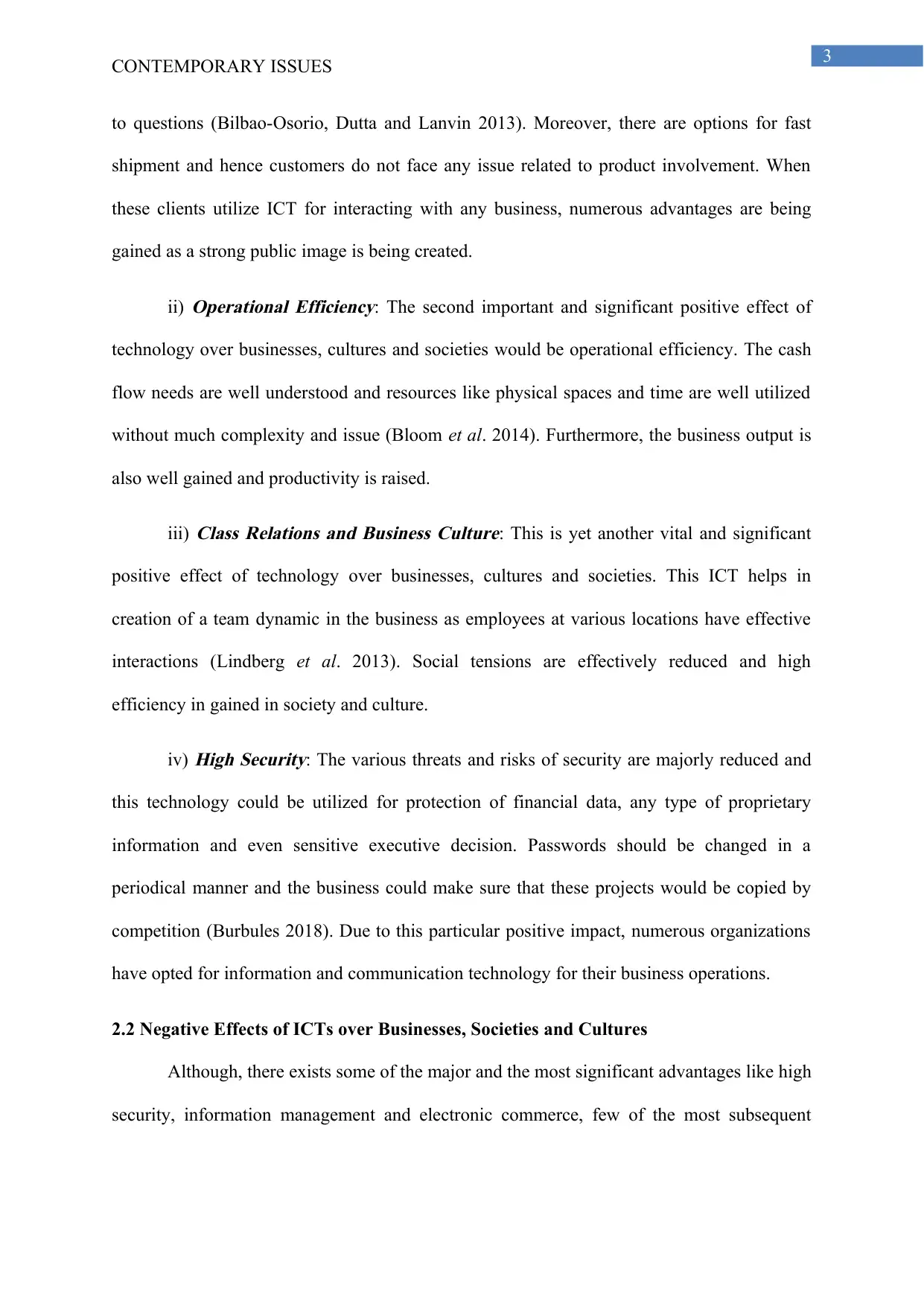
3
CONTEMPORARY ISSUES
to questions (Bilbao-Osorio, Dutta and Lanvin 2013). Moreover, there are options for fast
shipment and hence customers do not face any issue related to product involvement. When
these clients utilize ICT for interacting with any business, numerous advantages are being
gained as a strong public image is being created.
ii)
Operational Efficiency: The second important and significant positive effect of
technology over businesses, cultures and societies would be operational efficiency. The cash
flow needs are well understood and resources like physical spaces and time are well utilized
without much complexity and issue (Bloom et al. 2014). Furthermore, the business output is
also well gained and productivity is raised.
iii)
Class Relations and Business Culture: This is yet another vital and significant
positive effect of technology over businesses, cultures and societies. This ICT helps in
creation of a team dynamic in the business as employees at various locations have effective
interactions (Lindberg et al. 2013). Social tensions are effectively reduced and high
efficiency in gained in society and culture.
iv)
High Security: The various threats and risks of security are majorly reduced and
this technology could be utilized for protection of financial data, any type of proprietary
information and even sensitive executive decision. Passwords should be changed in a
periodical manner and the business could make sure that these projects would be copied by
competition (Burbules 2018). Due to this particular positive impact, numerous organizations
have opted for information and communication technology for their business operations.
2.2 Negative Effects of ICTs over Businesses, Societies and Cultures
Although, there exists some of the major and the most significant advantages like high
security, information management and electronic commerce, few of the most subsequent
CONTEMPORARY ISSUES
to questions (Bilbao-Osorio, Dutta and Lanvin 2013). Moreover, there are options for fast
shipment and hence customers do not face any issue related to product involvement. When
these clients utilize ICT for interacting with any business, numerous advantages are being
gained as a strong public image is being created.
ii)
Operational Efficiency: The second important and significant positive effect of
technology over businesses, cultures and societies would be operational efficiency. The cash
flow needs are well understood and resources like physical spaces and time are well utilized
without much complexity and issue (Bloom et al. 2014). Furthermore, the business output is
also well gained and productivity is raised.
iii)
Class Relations and Business Culture: This is yet another vital and significant
positive effect of technology over businesses, cultures and societies. This ICT helps in
creation of a team dynamic in the business as employees at various locations have effective
interactions (Lindberg et al. 2013). Social tensions are effectively reduced and high
efficiency in gained in society and culture.
iv)
High Security: The various threats and risks of security are majorly reduced and
this technology could be utilized for protection of financial data, any type of proprietary
information and even sensitive executive decision. Passwords should be changed in a
periodical manner and the business could make sure that these projects would be copied by
competition (Burbules 2018). Due to this particular positive impact, numerous organizations
have opted for information and communication technology for their business operations.
2.2 Negative Effects of ICTs over Businesses, Societies and Cultures
Although, there exists some of the major and the most significant advantages like high
security, information management and electronic commerce, few of the most subsequent
Paraphrase This Document
Need a fresh take? Get an instant paraphrase of this document with our AI Paraphraser
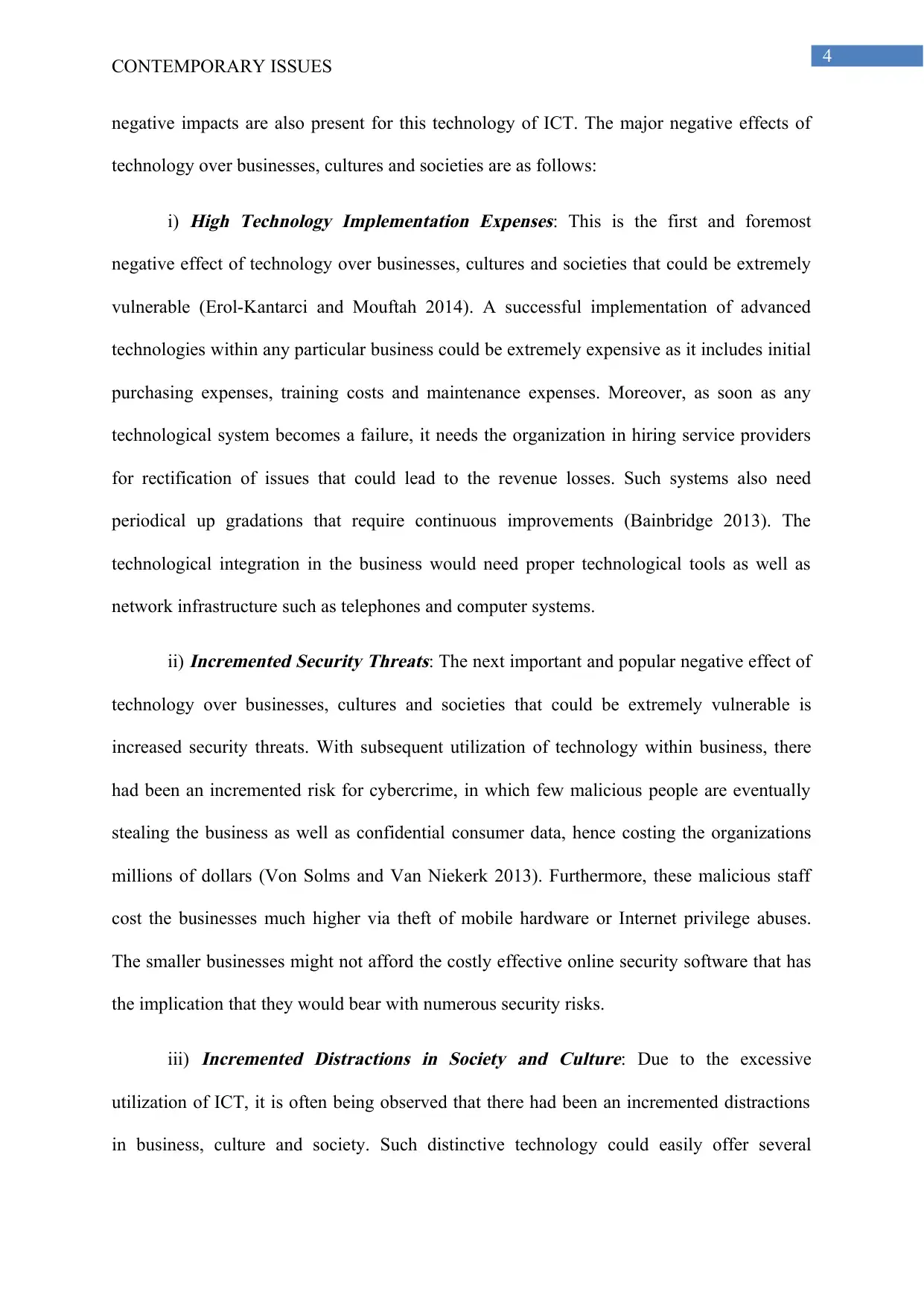
4
CONTEMPORARY ISSUES
negative impacts are also present for this technology of ICT. The major negative effects of
technology over businesses, cultures and societies are as follows:
i)
High Technology Implementation Expenses: This is the first and foremost
negative effect of technology over businesses, cultures and societies that could be extremely
vulnerable (Erol-Kantarci and Mouftah 2014). A successful implementation of advanced
technologies within any particular business could be extremely expensive as it includes initial
purchasing expenses, training costs and maintenance expenses. Moreover, as soon as any
technological system becomes a failure, it needs the organization in hiring service providers
for rectification of issues that could lead to the revenue losses. Such systems also need
periodical up gradations that require continuous improvements (Bainbridge 2013). The
technological integration in the business would need proper technological tools as well as
network infrastructure such as telephones and computer systems.
ii)
Incremented Security Threats: The next important and popular negative effect of
technology over businesses, cultures and societies that could be extremely vulnerable is
increased security threats. With subsequent utilization of technology within business, there
had been an incremented risk for cybercrime, in which few malicious people are eventually
stealing the business as well as confidential consumer data, hence costing the organizations
millions of dollars (Von Solms and Van Niekerk 2013). Furthermore, these malicious staff
cost the businesses much higher via theft of mobile hardware or Internet privilege abuses.
The smaller businesses might not afford the costly effective online security software that has
the implication that they would bear with numerous security risks.
iii)
Incremented Distractions in Society and Culture: Due to the excessive
utilization of ICT, it is often being observed that there had been an incremented distractions
in business, culture and society. Such distinctive technology could easily offer several
CONTEMPORARY ISSUES
negative impacts are also present for this technology of ICT. The major negative effects of
technology over businesses, cultures and societies are as follows:
i)
High Technology Implementation Expenses: This is the first and foremost
negative effect of technology over businesses, cultures and societies that could be extremely
vulnerable (Erol-Kantarci and Mouftah 2014). A successful implementation of advanced
technologies within any particular business could be extremely expensive as it includes initial
purchasing expenses, training costs and maintenance expenses. Moreover, as soon as any
technological system becomes a failure, it needs the organization in hiring service providers
for rectification of issues that could lead to the revenue losses. Such systems also need
periodical up gradations that require continuous improvements (Bainbridge 2013). The
technological integration in the business would need proper technological tools as well as
network infrastructure such as telephones and computer systems.
ii)
Incremented Security Threats: The next important and popular negative effect of
technology over businesses, cultures and societies that could be extremely vulnerable is
increased security threats. With subsequent utilization of technology within business, there
had been an incremented risk for cybercrime, in which few malicious people are eventually
stealing the business as well as confidential consumer data, hence costing the organizations
millions of dollars (Von Solms and Van Niekerk 2013). Furthermore, these malicious staff
cost the businesses much higher via theft of mobile hardware or Internet privilege abuses.
The smaller businesses might not afford the costly effective online security software that has
the implication that they would bear with numerous security risks.
iii)
Incremented Distractions in Society and Culture: Due to the excessive
utilization of ICT, it is often being observed that there had been an incremented distractions
in business, culture and society. Such distinctive technology could easily offer several
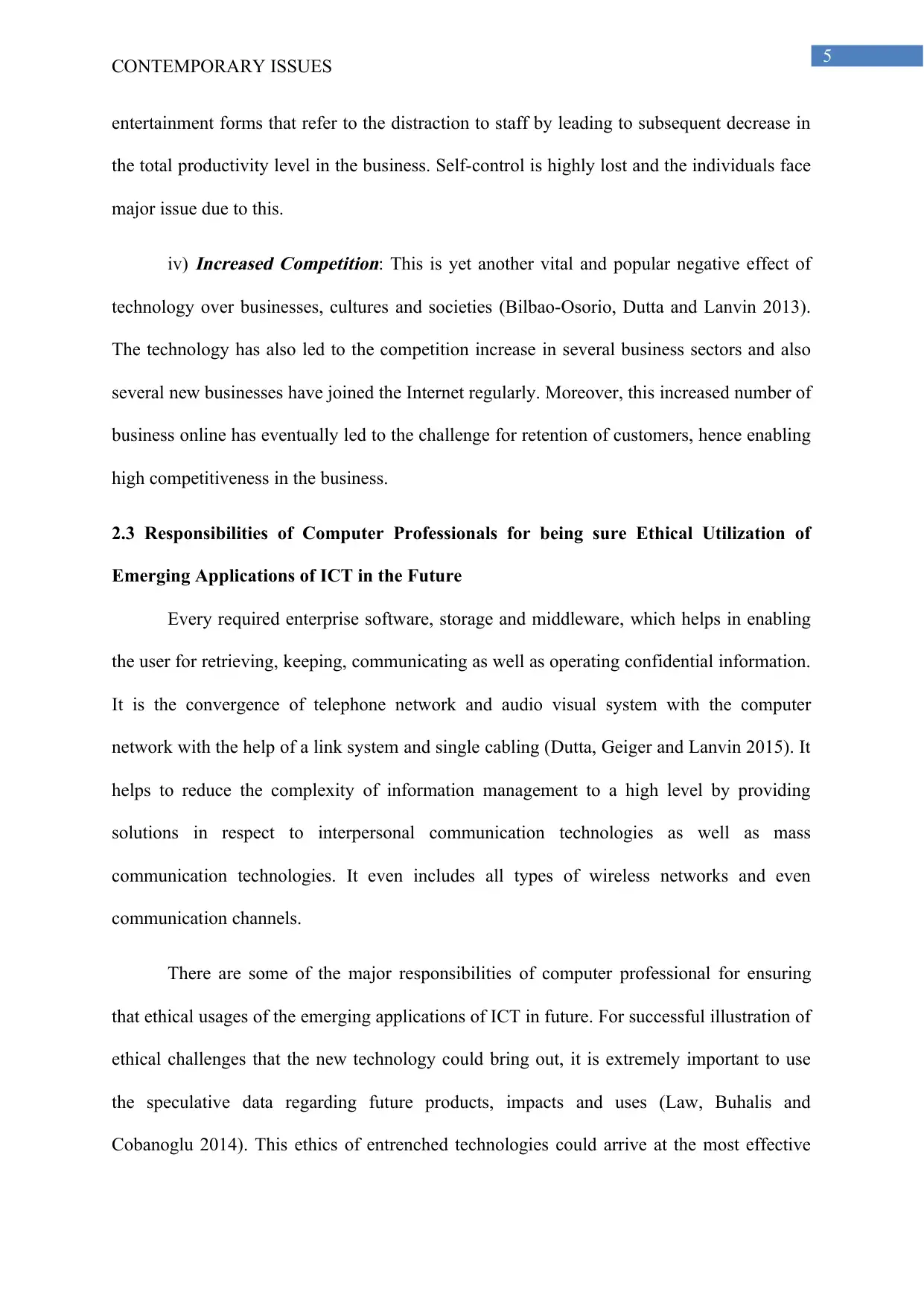
5
CONTEMPORARY ISSUES
entertainment forms that refer to the distraction to staff by leading to subsequent decrease in
the total productivity level in the business. Self-control is highly lost and the individuals face
major issue due to this.
iv)
Increased Competition: This is yet another vital and popular negative effect of
technology over businesses, cultures and societies (Bilbao-Osorio, Dutta and Lanvin 2013).
The technology has also led to the competition increase in several business sectors and also
several new businesses have joined the Internet regularly. Moreover, this increased number of
business online has eventually led to the challenge for retention of customers, hence enabling
high competitiveness in the business.
2.3 Responsibilities of Computer Professionals for being sure Ethical Utilization of
Emerging Applications of ICT in the Future
Every required enterprise software, storage and middleware, which helps in enabling
the user for retrieving, keeping, communicating as well as operating confidential information.
It is the convergence of telephone network and audio visual system with the computer
network with the help of a link system and single cabling (Dutta, Geiger and Lanvin 2015). It
helps to reduce the complexity of information management to a high level by providing
solutions in respect to interpersonal communication technologies as well as mass
communication technologies. It even includes all types of wireless networks and even
communication channels.
There are some of the major responsibilities of computer professional for ensuring
that ethical usages of the emerging applications of ICT in future. For successful illustration of
ethical challenges that the new technology could bring out, it is extremely important to use
the speculative data regarding future products, impacts and uses (Law, Buhalis and
Cobanoglu 2014). This ethics of entrenched technologies could arrive at the most effective
CONTEMPORARY ISSUES
entertainment forms that refer to the distraction to staff by leading to subsequent decrease in
the total productivity level in the business. Self-control is highly lost and the individuals face
major issue due to this.
iv)
Increased Competition: This is yet another vital and popular negative effect of
technology over businesses, cultures and societies (Bilbao-Osorio, Dutta and Lanvin 2013).
The technology has also led to the competition increase in several business sectors and also
several new businesses have joined the Internet regularly. Moreover, this increased number of
business online has eventually led to the challenge for retention of customers, hence enabling
high competitiveness in the business.
2.3 Responsibilities of Computer Professionals for being sure Ethical Utilization of
Emerging Applications of ICT in the Future
Every required enterprise software, storage and middleware, which helps in enabling
the user for retrieving, keeping, communicating as well as operating confidential information.
It is the convergence of telephone network and audio visual system with the computer
network with the help of a link system and single cabling (Dutta, Geiger and Lanvin 2015). It
helps to reduce the complexity of information management to a high level by providing
solutions in respect to interpersonal communication technologies as well as mass
communication technologies. It even includes all types of wireless networks and even
communication channels.
There are some of the major responsibilities of computer professional for ensuring
that ethical usages of the emerging applications of ICT in future. For successful illustration of
ethical challenges that the new technology could bring out, it is extremely important to use
the speculative data regarding future products, impacts and uses (Law, Buhalis and
Cobanoglu 2014). This ethics of entrenched technologies could arrive at the most effective
⊘ This is a preview!⊘
Do you want full access?
Subscribe today to unlock all pages.

Trusted by 1+ million students worldwide
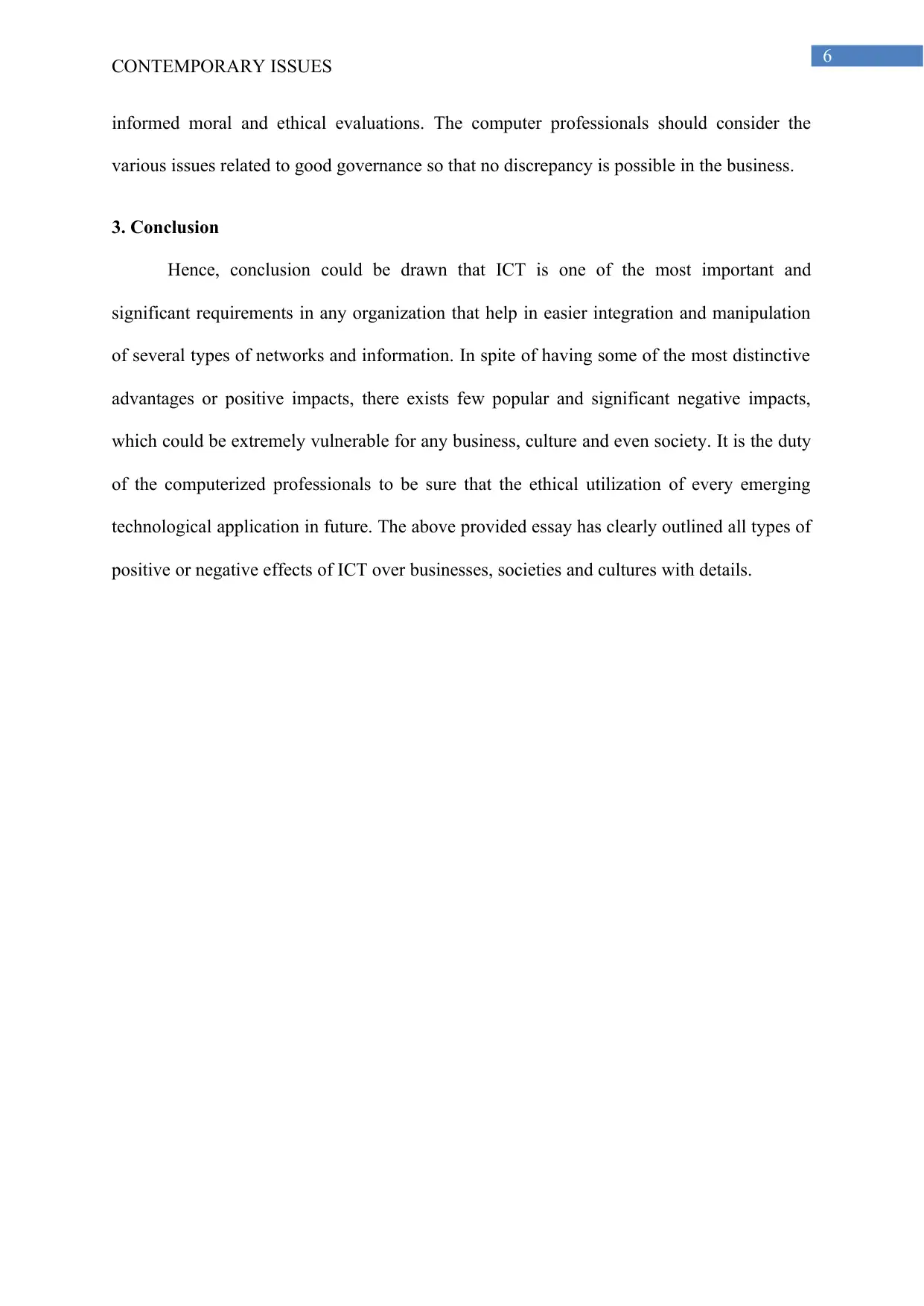
6
CONTEMPORARY ISSUES
informed moral and ethical evaluations. The computer professionals should consider the
various issues related to good governance so that no discrepancy is possible in the business.
3. Conclusion
Hence, conclusion could be drawn that ICT is one of the most important and
significant requirements in any organization that help in easier integration and manipulation
of several types of networks and information. In spite of having some of the most distinctive
advantages or positive impacts, there exists few popular and significant negative impacts,
which could be extremely vulnerable for any business, culture and even society. It is the duty
of the computerized professionals to be sure that the ethical utilization of every emerging
technological application in future. The above provided essay has clearly outlined all types of
positive or negative effects of ICT over businesses, societies and cultures with details.
CONTEMPORARY ISSUES
informed moral and ethical evaluations. The computer professionals should consider the
various issues related to good governance so that no discrepancy is possible in the business.
3. Conclusion
Hence, conclusion could be drawn that ICT is one of the most important and
significant requirements in any organization that help in easier integration and manipulation
of several types of networks and information. In spite of having some of the most distinctive
advantages or positive impacts, there exists few popular and significant negative impacts,
which could be extremely vulnerable for any business, culture and even society. It is the duty
of the computerized professionals to be sure that the ethical utilization of every emerging
technological application in future. The above provided essay has clearly outlined all types of
positive or negative effects of ICT over businesses, societies and cultures with details.
Paraphrase This Document
Need a fresh take? Get an instant paraphrase of this document with our AI Paraphraser
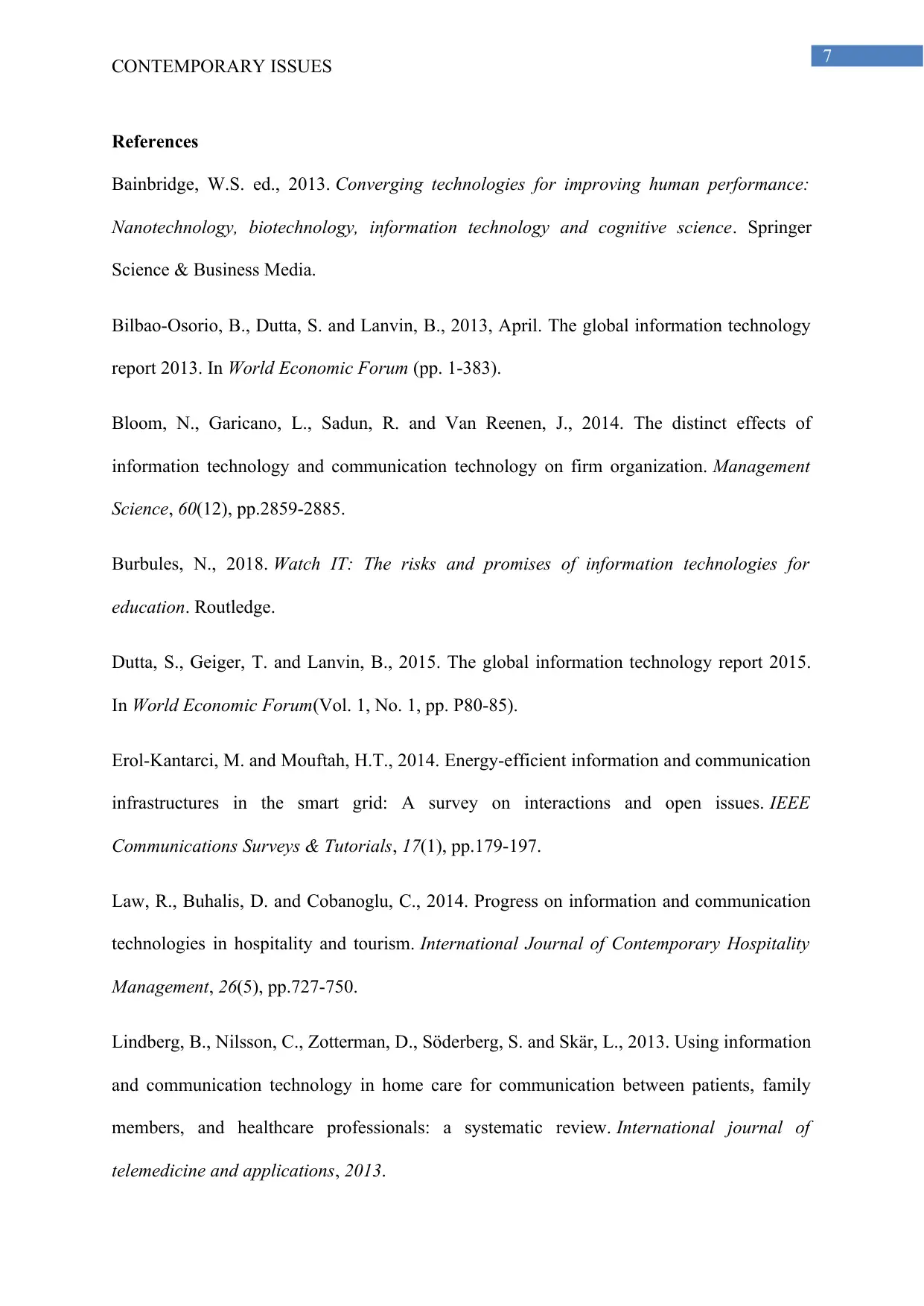
7
CONTEMPORARY ISSUES
References
Bainbridge, W.S. ed., 2013. Converging technologies for improving human performance:
Nanotechnology, biotechnology, information technology and cognitive science. Springer
Science & Business Media.
Bilbao-Osorio, B., Dutta, S. and Lanvin, B., 2013, April. The global information technology
report 2013. In World Economic Forum (pp. 1-383).
Bloom, N., Garicano, L., Sadun, R. and Van Reenen, J., 2014. The distinct effects of
information technology and communication technology on firm organization. Management
Science, 60(12), pp.2859-2885.
Burbules, N., 2018. Watch IT: The risks and promises of information technologies for
education. Routledge.
Dutta, S., Geiger, T. and Lanvin, B., 2015. The global information technology report 2015.
In World Economic Forum(Vol. 1, No. 1, pp. P80-85).
Erol-Kantarci, M. and Mouftah, H.T., 2014. Energy-efficient information and communication
infrastructures in the smart grid: A survey on interactions and open issues. IEEE
Communications Surveys & Tutorials, 17(1), pp.179-197.
Law, R., Buhalis, D. and Cobanoglu, C., 2014. Progress on information and communication
technologies in hospitality and tourism. International Journal of Contemporary Hospitality
Management, 26(5), pp.727-750.
Lindberg, B., Nilsson, C., Zotterman, D., Söderberg, S. and Skär, L., 2013. Using information
and communication technology in home care for communication between patients, family
members, and healthcare professionals: a systematic review. International journal of
telemedicine and applications, 2013.
CONTEMPORARY ISSUES
References
Bainbridge, W.S. ed., 2013. Converging technologies for improving human performance:
Nanotechnology, biotechnology, information technology and cognitive science. Springer
Science & Business Media.
Bilbao-Osorio, B., Dutta, S. and Lanvin, B., 2013, April. The global information technology
report 2013. In World Economic Forum (pp. 1-383).
Bloom, N., Garicano, L., Sadun, R. and Van Reenen, J., 2014. The distinct effects of
information technology and communication technology on firm organization. Management
Science, 60(12), pp.2859-2885.
Burbules, N., 2018. Watch IT: The risks and promises of information technologies for
education. Routledge.
Dutta, S., Geiger, T. and Lanvin, B., 2015. The global information technology report 2015.
In World Economic Forum(Vol. 1, No. 1, pp. P80-85).
Erol-Kantarci, M. and Mouftah, H.T., 2014. Energy-efficient information and communication
infrastructures in the smart grid: A survey on interactions and open issues. IEEE
Communications Surveys & Tutorials, 17(1), pp.179-197.
Law, R., Buhalis, D. and Cobanoglu, C., 2014. Progress on information and communication
technologies in hospitality and tourism. International Journal of Contemporary Hospitality
Management, 26(5), pp.727-750.
Lindberg, B., Nilsson, C., Zotterman, D., Söderberg, S. and Skär, L., 2013. Using information
and communication technology in home care for communication between patients, family
members, and healthcare professionals: a systematic review. International journal of
telemedicine and applications, 2013.
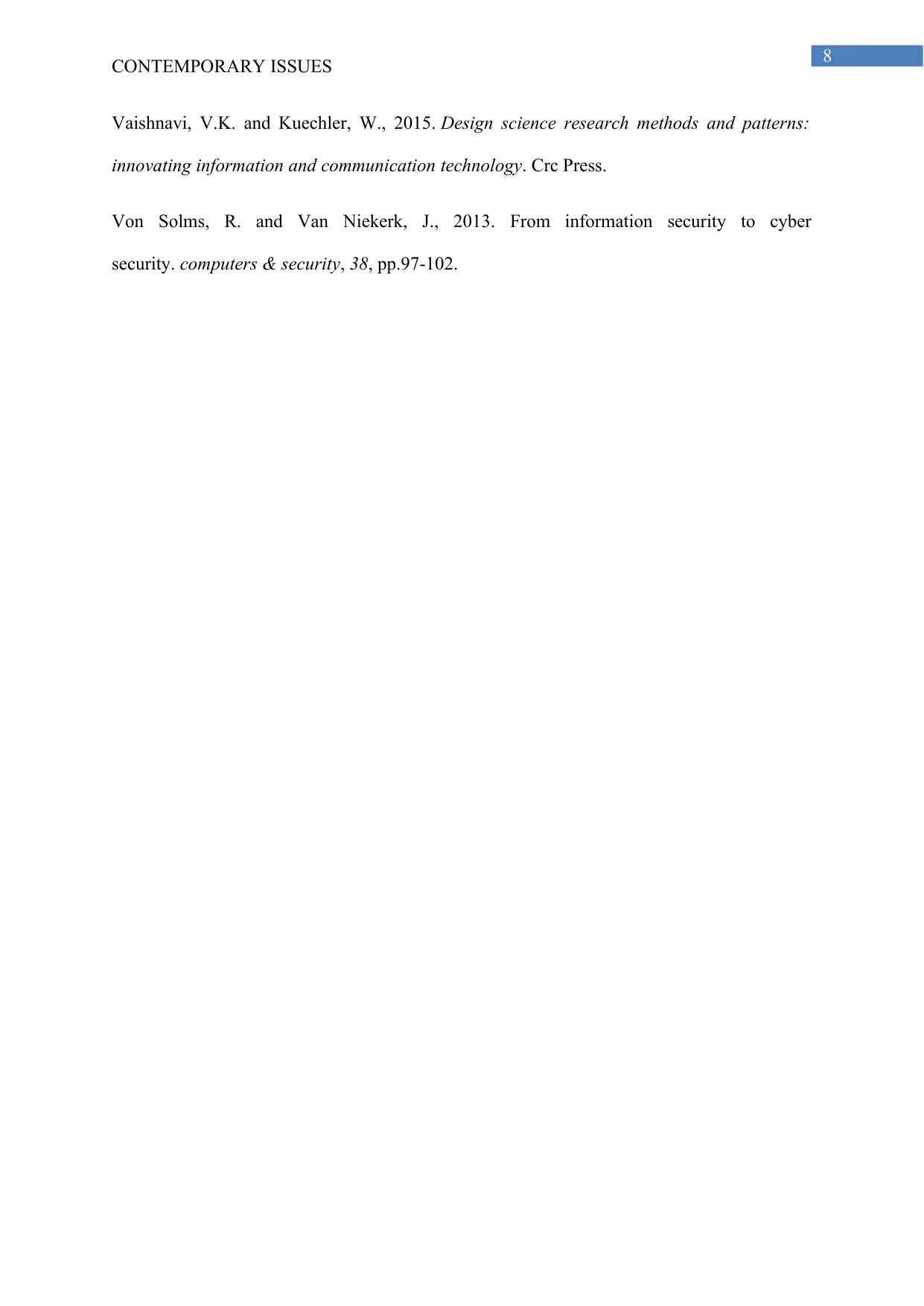
8
CONTEMPORARY ISSUES
Vaishnavi, V.K. and Kuechler, W., 2015. Design science research methods and patterns:
innovating information and communication technology. Crc Press.
Von Solms, R. and Van Niekerk, J., 2013. From information security to cyber
security. computers & security, 38, pp.97-102.
CONTEMPORARY ISSUES
Vaishnavi, V.K. and Kuechler, W., 2015. Design science research methods and patterns:
innovating information and communication technology. Crc Press.
Von Solms, R. and Van Niekerk, J., 2013. From information security to cyber
security. computers & security, 38, pp.97-102.
⊘ This is a preview!⊘
Do you want full access?
Subscribe today to unlock all pages.

Trusted by 1+ million students worldwide
1 out of 9
Related Documents
Your All-in-One AI-Powered Toolkit for Academic Success.
+13062052269
info@desklib.com
Available 24*7 on WhatsApp / Email
![[object Object]](/_next/static/media/star-bottom.7253800d.svg)
Unlock your academic potential
Copyright © 2020–2026 A2Z Services. All Rights Reserved. Developed and managed by ZUCOL.




